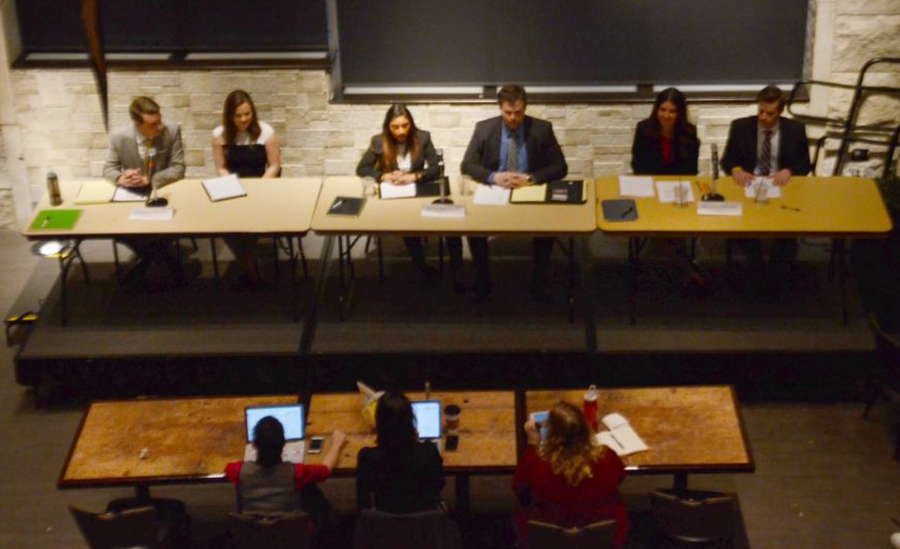
Candidates for Missouri Students Association president and vice president participated in the second presidential debate of the election season Monday night. This was the last official debate between the slates: Tori Schafer and Riley de Leon, Josh Stockton and Shruti Gulati, and Nathan Willett and Payton Englert. Voting for the election opens March 6 at vote.missouri.edu and ends March 8, with the announcement of the winner to follow full Senate.
The debate, which lasted two hours, covered topics including gun laws on campus, the organizations of joint session and the slates’ analysis of the current MSA Senate.
Here are five notable moments from the debate:
####1. All three slates said MSA was too “political.”
Each slate mentioned ending “politics” in MSA Senate and instead focusing on students, specifically with retention and recruitment. Last year, MSA President-elect Haden Gomez and running mate Chris Hanner resigned the night of their scheduled inauguration. Former Board of Elections Commissioners Chairwoman Emma Henderson, current BEC Chairwoman Brooke Wiggins and current Chief Justice Whitney Barr have all been threatened with impeachment.
Last year, junior Alex Higginbotham announced through a Facebook post the day after Gomez’s resignation that he was resigning from his position as chairman of the MSA Campus and Community Relations Committee. In the Facebook post, Higginbotham said he could not be a part of an association willing to stoop to “cruelty and bullying” to reach an end. He called the open-meeting portion of Senate a “public execution.” During the open forum, senators were very critical of Gomez and Hanner’s character.
Willett/Englert and Stockton/Gulati both criticized MSA Senate for not doing more to recruit students to the organization. In response, Schafer said she didn’t think people who “barely show up to meetings” should critique its retention and recruitment efforts. Each slate emphasized social media as a way to enhance recruitment.
####2. Stockton called for joint session to require full-time members to be in MSA Senate.
In response to how to improve joint session, Josh Stockton said the organizations of joint session should have a full-time member to attend Senate each week. The organizations a part of joint session are full-functioning governments.
“I do think all of these governments should have a full-time representative in the Senate,” Stockton said. “I don’t get the whole point of having just academic colleges and then a few at large seats.”
Senate would have to create a referendum for students to vote on to amend the constitution for this to happen.
MSA has been criticized in the past for being the focal point of joint session. During last year’s joint session, Residence Halls Association President Matt Bourke criticized MSA’s attitude to the rest of the body and said he did not think MSA should be the permanent chair of any meetings. In response, Schafer had said it was “childish” to characterize MSA President Sean Earl’s suggestion as a “power grab.”
Schafer/de Leon said more communication and sharing of information between the organization before the joint session meetings would be beneficial and proactive.
####3. Willett/Englert and Schafer/de Leon have clashed over It’s On Us.
During the last debate, the Tigers Together staff of Willett/Englert’s campaign tweeted, “Tori has done a great job working for It’s On Us, but we think it takes more than writing 3 words on your hand and taking a photo.”
When Willett/Englert were asked to give alternatives they would promote during their campaign instead of It’s On Us, the slate said they would continue the efforts of It’s On Us. Englert suggested hosting a sexual assault rally modeled after another university.
Schafer leads MU’s chapter of It’s On Us. The campaign is partnered with Green Dot and has a committee that meets biweekly. Schafer started the It’s On Us committee last year as a part of the Earl/Schafer Empower MU slate.
####4. None of the three slates could name all 12 joint session student governments.
Toward the end of the debate, each slate was given a whiteboard to test their knowledge on the auxiliaries within MSA and the organizations that are a part of joint session. Willett/Englert was the only slate to successfully name all 11 auxiliaries. Schafer/de Leon named 10 and Stockton/Gulati named seven. None of the slates were able to name the 12 governments of joint session. Each were only able to name 10.
####5. All three slates said students should be able to make time to be involved in organizations such as MSA.
Because of the cost of attending the university, some students must work to pay for their education instead of being involved in student organizations such as MSA.
When asked how to ensure that these students’ needs are met, each slate cited their own involvement and said students should be able to make time. Many candidates said they themselves have held jobs while working with MSA.
“I have made time with my course load to be more involved,” Gulati said.
_Edited by Emily Gallion | [email protected]_